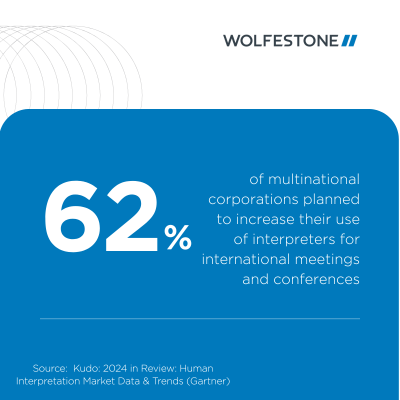𝘈𝘱𝘱𝘳𝘰𝘹 𝘳𝘦𝘢𝘥 𝘵𝘪𝘮𝘦: 4 𝘮𝘪𝘯𝘴🕒
Almost two-thirds (62%) of multinational corporations planned to increase their use of interpreters for international meetings and conferences, a 2024 survey shows.
I’d argue that in a business setting, interpreting is quite underrated.
What do I mean by that?
Not as an ability, I think it’s well appreciated. However, in business, it’s not considered as much as it perhaps should be for the value it brings. Although usage is increasing based on recent research.
Ultimately, there are no guarantees that all of your participants at any event or meeting can fully understand everything. Interpreting bridges that gap through the four types: consecutive, simultaneous, liaison and sign language to convey crucial information, make people feel valued and boost accessibility.
But there is much more detail about it all.
Our company has worked on hundreds of interpreting projects, so we are well-placed to offer insight into the topic.
So, let’s take a detailed look at what is interpreting in business, who it impacts, why and more.
What is interpreting in business?
Interpreting refers to changing spoken or signed language from one language to another. This enables everyone to be understood in a business setting, such as a board meeting or negotiations.
Interpreting in business can span huge multinational businesses, all the way to Small and Medium-sized Enterprises (SMEs).
Note: An interpreter is not to be confused with a translator, whose role is to focus on changing written words or text from one language to another.
What are the types of interpreting in business?
Consecutive interpreting
The interpreters will listen to the speaker and when they pause, they will then repeat what has been said in the language required. They may take notes using symbols for longer parts of speech. This practice is useful for meetings, interviews and negotiations.
Simultaneous interpreting
The translation of the language occurs without pauses. The interpreter listens to the sentence and provides a real-time translation of the spoken word. This method is often used at events and conferences.
Liaison interpreting
This involves interpreting in and out of the language required. The interpreter could opt for the consecutive or simultaneous method.
Sign language interpreting
Sign language interpreting, such as British Sign Language (BSL) or American Sign Language (ASL), may be used for participants in negotiations or a live event who are deaf or hard of hearing.
Explore more BSL interpreting options at our sister company, VoiceBox.

Who does interpreting in business impact?
- CEOs/founders
- Board members
- Senior members of staff
- Training leads
- Interviewers/interviewees
- Event attendees
- Webinar participants (you can also get your webinar recordings transcribed)
- And more
Why is interpreting important for multinational businesses?
Interpreting helps convey crucial details
Business details are pivotal. There usually isn’t room for misunderstanding.
This could be the details of how much something costs, the timeframe of a project or deal, an interviewee’s background or how an employee portrays context and their intonation in an important point they are making. These are all vital in the workings of global enterprise and trade.
Miscommunication of details is the difference between a negotiation being successful or falling through.
A professional interpreter can bridge the gap between diverse business environments and make sure every party involved in an event, meeting, transaction, etc. understands every word and the underlying context.
For best results, we'd highly recommend utilising an interpreter who is an industry specialist. This guarantees they understand the context, technical terms and nuances of your sector, resulting in more accurate interpretation.
Everyone feels valued
Interpreting facilitates effective multilingual communication and ensures cultural etiquette; global business practices and regional idioms are accurately conveyed.
Therefore, all participants feel valued and respected. This can only strengthen relationships ahead of prospective mergers and acquisitions, deals, and beyond.
Boosts accessibility
For businesses engaging with diverse communities, the value of sign language interpretation cannot be overlooked. These services not only help with understanding but also boost communication for deaf and hard of hearing people in business.
If it’s provided, the organisers are seen to be inclusive, and word will likely spread which is only a positive thing.
Speaking of spreading the word - results from Euan’s Guide Access Survey show that nearly half (47%) of respondents said they were very likely to share their experiences of disabled access with others.
Not only that, the Purple Pound (spending power of disabled households) is worth around £274 billion to the UK economy. So, there is plenty to be said for making events in business accessible to not only make more people feel welcome but to also raise margins.
Case study: Innovate Access event
In February this year, the Innovate Access event at BT Headquarters, London, combined disabled, deaf, hard of hearing and neurodivergent entrepreneurs with officials from AI and Assistive Technology businesses.
Here, several British Sign Language interpreters altered across the day for both panel discussions and individual talks.
This made the discussion much more accessible to deaf and hard of hearing audiences, ensuring all entrepreneurs could appreciate the event.
"For multinational businesses, interpreting services aren't just about understanding words; they're about unlocking true communication. They bridge cultural gaps and ensure that the nuances of your message are accurately conveyed, fostering trust and building stronger relationships with partners and clients across the globe. That's invaluable for success in the international marketplace."
When else do you need interpreting in business?
Other situations where interpreting is needed in business can involve:
- Negotiations
- Mergers and Acquisitions
- Meetings
- Training
- Interviews
- Consultations
- Presentations
- Formal dinners
- Factory tours
- Press conferences
- And more
Conclusion
There is all you need to know about interpreting in business, without the fluff.
Hopefully, you’ll now be able to better assess whether interpreting is needed in your company.
If it is, explore our interpreting services today.
𝘑𝘢𝘤𝘬 𝘸𝘳𝘪𝘵𝘦𝘴 𝘢𝘣𝘰𝘶𝘵 𝘵𝘳𝘢𝘯𝘴𝘭𝘢𝘵𝘪𝘰𝘯, 𝘭𝘰𝘤𝘢𝘭𝘪𝘴𝘢𝘵𝘪𝘰𝘯 𝘢𝘯𝘥 𝘮𝘰𝘳𝘦 𝘭𝘢𝘯𝘨𝘶𝘢𝘨𝘦 𝘴𝘰𝘭𝘶𝘵𝘪𝘰𝘯𝘴 𝘧𝘰𝘳 𝘞𝘰𝘭𝘧𝘦𝘴𝘵𝘰𝘯𝘦. 𝘏𝘦 𝘭𝘰𝘷𝘦𝘴 𝘵𝘰 𝘧𝘪𝘯𝘥 𝘳𝘦𝘢𝘭-𝘭𝘪𝘧𝘦 𝘦𝘹𝘢𝘮𝘱𝘭𝘦𝘴 𝘰𝘧 𝘸𝘩𝘦𝘯 𝘴𝘰𝘭𝘶𝘵𝘪𝘰𝘯𝘴 𝘩𝘢𝘷𝘦 𝘢𝘯𝘥 𝘩𝘢𝘷𝘦𝘯'𝘵 𝘸𝘰𝘳𝘬𝘦𝘥 𝘵𝘰 𝘱𝘳𝘰𝘷𝘪𝘥𝘦 𝘢𝘴 𝘮𝘶𝘤𝘩 𝘳𝘦𝘭𝘢𝘵𝘢𝘣𝘭𝘦, 𝘰𝘳𝘪𝘨𝘪𝘯𝘢𝘭 𝘤𝘰𝘯𝘵𝘦𝘯𝘵 𝘵𝘰 𝘵𝘩𝘦 𝘢𝘶𝘥𝘪𝘦𝘯𝘤𝘦 𝘢𝘴 𝘱𝘰𝘴𝘴𝘪𝘣𝘭𝘦.







